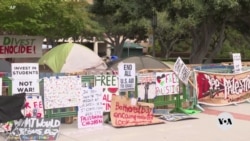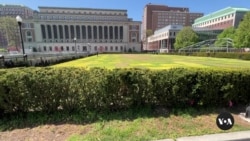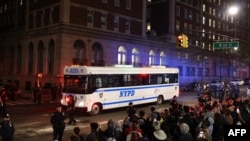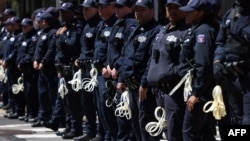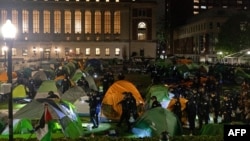Student Union
Some US Colleges Cancel, Postpone Graduation Over Virus
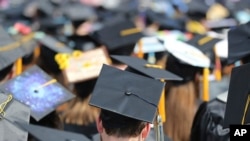
Colleges across the U.S. have begun canceling and curtailing graduation amid fears that the coronavirus pandemic will stretch into spring. Some are exploring “virtual” alternatives, while others are considering inviting seniors back for commencement at a later date or just mailing out diplomas.
Schools including Brigham Young University, the Savannah College of Art and Design and Berea College are among those telling students that current commencement ceremonies have been canceled. But dozens of other schools say it's too soon to decide, leaving families uncertain about whether to book flights and hotels and students wondering whether to purchase caps and gowns for the walk across the stage.
The graduation decision is being made as colleges scramble to move instruction online and send students home, a move being made by dozens of schools in an attempt to curb spread of the virus. The list of those moving to the web continued to grow Thursday, with schools from Southern Methodist University to the University of Alaska making the change.
At Grinnell College in Iowa, which is sending students home this month, officials said there will be no “traditional” graduation ceremony. Instead, the school is mulling how it could honor graduating seniors in an online ceremony. Officials are also debating whether to bring seniors back in 2021 and offer a ceremony for two classes at once.
“We want to be celebrate and cherish our students,” said Anne Harris, dean and vice president for academic affairs at the private school of 1,700 students. “But we were following the logic: If we're sending everybody out, why would we bring everybody back in?”
Some students say they understand the need for caution but would feel robbed if they missed a milestone that they spent years working to reach.
At Wesleyan University in Connecticut, which is still weighing options, senior Melisa Olgun said commencement is a celebration not only of her college career but also the sacrifices that her parents, immigrants from Turkey, made to get her there. Olgun is the first in her family to graduate from a U.S. university and wants her mother to see her accept her diploma.
“This diploma is not just for myself. It's for my family, it's for my parents,” Olgun said. “That ability to stand on that stage, to do that, is something I've been thinking of and dreaming of since I was a young girl.”
Still, she feels conflicted about a possible cancellation. “On one hand I'm very sad, but I also acknowledge the seriousness of the situation and I'm trying to be rational and understanding about that,” she said.
“Officials at Cornell University said they still hope to host their traditional ceremony but warned that it's unknown whether that will be possible. Florida International University told students that events are expected to proceed but said officials are also working on “possible alternative plans.”
The coronavirus has infected around 128,000 people worldwide and killed over 4,700. The death toll in the U.S. climbed to 39, with over 1,300 infections.
For most people, the virus causes only mild or moderate symptoms, such as fever and cough. For some, especially older adults and people with existing health problems, it can cause more severe illnesses, including pneumonia. The vast majority of people recover from the virus in a matter of weeks.
Schools say they're following the advice of the U.S. Centers for Disease Control & Prevention and state health officials who are recommending against mass gatherings as the virus spreads. Governors in some states have called for limits on large events. But schools say it's hard to forecast where things will stand in two months, and some say it would be premature to cancel.
Some colleges, however, said they're canceling now so they don't force parents to scuttle their plans at the last minute.
Berea College in Kentucky was among the first to cancel ceremonies this week, telling students it would be rescheduled “to a date when such a gathering can be conducted safely.” Officials said they were erring on the side of caution but still want to honor graduates.
“They've worked hard and we want to recognize all that they've accomplished. But we want to do that in a way that protects them and doesn't jeopardize their safety,” said Tim Jordan, a school spokesman.
Canceling commencement can also carry financial implications for schools. Some colleges spend hundreds of thousands of dollars on ceremonies featuring celebrity speakers, dining spreads and other displays of pomp and circumstance. Colleges that have canceled say they don't know if their speakers will return for later events, or how the cancellation will affect budgets.
Some schools, including Tulane University are already announcing that, in case of a cancellation, students will be refunded for their regalia purchases.
Some schools are scaling back ceremonies without eliminating them entirely. The Florida Institute of Technology says the school's spring ceremony will be broken into several smaller events that only students will be allowed to attend. Families will be able to watch online, officials said, and graduates can also return for summer or fall exercises.
California State University, Sacramento, said it will make a decision about commencement once officials have “a better understanding of the ongoing impact” of the virus. But the school has decided to cancel all other graduation activities, including hooding ceremonies and cultural celebrations.
Canceling graduation is rare but not without precedent in the United States. Schools across the nation scrapped ceremonies in 1970 amid protests over the Vietnam War, and some invited students back to be honored decades later. More recently, outdoor ceremonies in Florida and Texas have been called off amid heavy storms, but most were rescheduled later.
At Harvard University, senior Tom Osborn is now wondering whether his family from Migori, Kenya, should cancel their plans to visit for graduation. The school, which is sending students home this week, said it's too soon to make a decision but officials are working on contingency plans.
“It was going to be my family's first time to campus. They were all excited,'' said Osborn, who is studying psychology. “It's unfortunate. I hope things will still work out.”
See all News Updates of the Day
Pro-Palestinian protests in US could impact 2024 election
Despite the fact that many of their encampments at university campuses have been dismantled, pro-Palestinian demonstrators in the United States are standing their ground. If the protests continue, some analysts say they could have an impact on the 2024 presidential election. VOA’s Veronica Balderas Iglesias explains.
- By VOA News
Pro-Palestinian protest ends quietly at University of Southern California
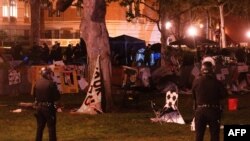
Pro-Palestinian protesters at an encampment at the University of Southern California, one of the focal points of anti-Israel protests across U.S. college campuses, left the scene early Sunday after authorities warned them that they could be arrested.
Their departure came after university safety officers and Los Angeles police began clearing the center of campus, where police had arrested 93 people on April 24.
"If you are in the center of campus, please leave,” the university warned the protesters on the social media platform X, saying they could be arrested if they stayed.
Elsewhere, pro-Palestinian protests continued at several college graduation ceremonies on Saturday.
At the University of Virginia, 25 people were arrested for trespassing after police clashed with pro-Palestinian protesters who refused to remove tents from the campus.
At the University of Michigan, demonstrators chanted anti-war messages and waved flags during graduation ceremonies. More protests occurred at Indiana University, Ohio State University, Princeton University in New Jersey and Northeastern University in Massachusetts.
- By VOA News
Amid internship pressure, international students should focus on self-care
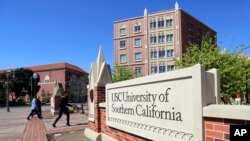
That’s the argument of Edhita Singhal, an international student from India studying at the University of Southern California.
Despite the fear of not finding a good internship, it’s important to relax and take care of yourself, she writes in her biweekly column for campus newspaper The Daily Trojan. (April 2024)
- By Tina Trinh
Columbia students on edge as police presence remains on campus after raid to clear protesters
Police remain on Columbia University’s campus, even after clearing out student protesters and their encampment. But questions remain about how the university and the students move forward. Tina Trinh reports from New York.
Columbia University student journalists had an up-close view for days of drama
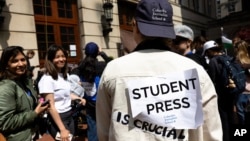
Student journalists on the Columbia University campus knew what was coming long before police with riot shields arrived to begin arresting the pro-Palestinian protesters.
They had watched the situation spiral as the protesters stood their ground, refusing to abandon Hamilton Hall and using a pulley system to bring supplies into the building they had occupied.
The reporters, working for university and online U.S. and international publications, suspected negotiations with administrators were going nowhere when the protesters began donning COVID-era masks to hide their identities. Some began sleeping on the floor in journalism classrooms or offices out of fear of missing something.
But when a journalism professor began writing the phone number to call if they were arrested in permanent marker on their arms, that was the moment it became clear: They were capturing history.
The police operation Tuesday night that cleared out Hamilton Hall capped two weeks of drama over the protests at Columbia, which student journalists at the Ivy League school lived through as they were covering it.
Other media were being kept off campus, so these reporters were the only ones who could capture what was happening.
"I just woke up and I was like, I'm going to go and take some pictures," said Seyma Bayram, a Columbia journalism fellow focused on creating a longform investigative podcast unrelated to the protests.
The encampments were a visual feast. There were musical performances, students reading and helping each other write papers for their classes. She wanted to document it all.
By Monday, students were facing suspension if they didn't leave. Crowds marched around the encampment chanting. Students were given written notices from the administration, warning them to go. They ripped them up, dumped them in trash bins. Rumors were flying.
That night, Bayram was unwilling to go home, sleeping on her office floor.
"How," she wondered, "are they going to remove the students. They're not leaving."
By Tuesday, she was exhausted. The student reporters charged their cameras and other gear and waited.
Many protesters were starting to leave, recalled Shayeza Walid, a graduate journalism student at Columbia, who covered the arrests for the news website Al-Monitor.
The sun was setting as they held hands and chanted, knowing they faced academic repercussions by remaining. Many had given up covering their faces by now, Walid said.
To her, the chants sounded like a hymn and she saw the protesters, some clad in Palestinian keffiyehs, crying. She doubts she will ever forget it.
"It felt so both inspirational and devastating because these were the kids who were willing to get arrested," she recalled.
And then police started assembling outside, setting up barricades. Even on campus, Bayram could tell by the photos posted on social media that police action was imminent. And then the police were there.
"I don't know, it was just like all of a sudden there were just like police, ... riot gear everywhere," Bayram said.
The student journalists were walking backward, filming as they went, Bayram said.
She was pushed off campus. Police buses and officers were everywhere. Around her, people were being arrested.
"Those of us who are pushed out, like student reporters and faculty, I think we were just all horrified that no press was present outside of, or inside of, Hamilton Hall," Bayram said.
Walid recalled that the reporters paired up for safety. Her partner, an international student, had never seen so many police in one place. "And frankly, I hadn't either," Walid said.
She said the police also seemed shocked when they came into campus and saw how few students were left. "It was very evidently disproportionate from where we were standing," she said.
Before the arrests, protesters inside the campus used a megaphone to lead those protesting outside in chants, recalled Cecilia Blotto, a graduate journalism student, who has been publishing photos and video to Uptown Radio, a project of the university's journalism program.
"Columbia, you are a liar," she recalled them chanting, along with "Disclose, divest! We will not stop, we will not rest."
Then Blotto saw police buses pull up, officers exiting with shields and zip ties. Then they played a recording saying that if the protesters didn't disperse they would be arrested.
"People were like being dragged out on the street, with like four cops holding a leg and an arm each. I saw some really, like, striking images of people, like, yelling shame at the cops, while they were dragging out students," Blotto said. She tried to film it all.
Emily Byrski, a graduate student who had a phone number written on her arm in case she was arrested, said the students weren't totally unprepared. There had been a training session.
Still, she said, there had been so many false alerts.
"It's like the boy who cried wolf. Like, there were two or three nights here where we were told, there was a rumor going around that the NYPD was coming, please come to campus," she recalled.
Byrski had knee surgery earlier in the year, so was unable to run as police descended. She limped along with her buddy.
"So we're sort of seeing this all happen from inside and trying to document it as the NYPD is grabbing people, like shoving them to the ground. It was pretty horrifying to see, like, right a foot away from me," Byrski said.
She said she has seen professors cry over the last week. She is pondering it all, uncertain what to make of it.
"I'm just sort of in shock," Byrski said. "I think we all kind of were in shock."





